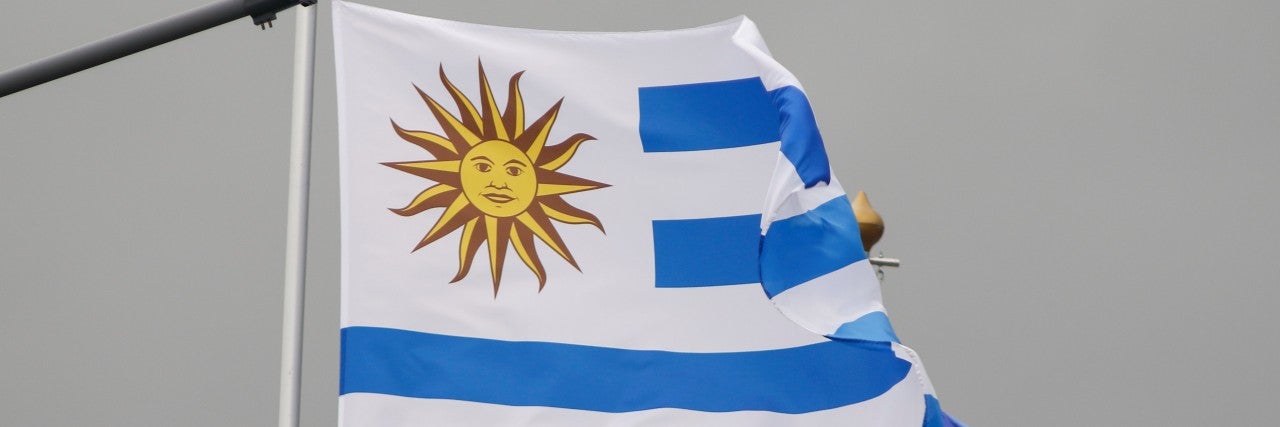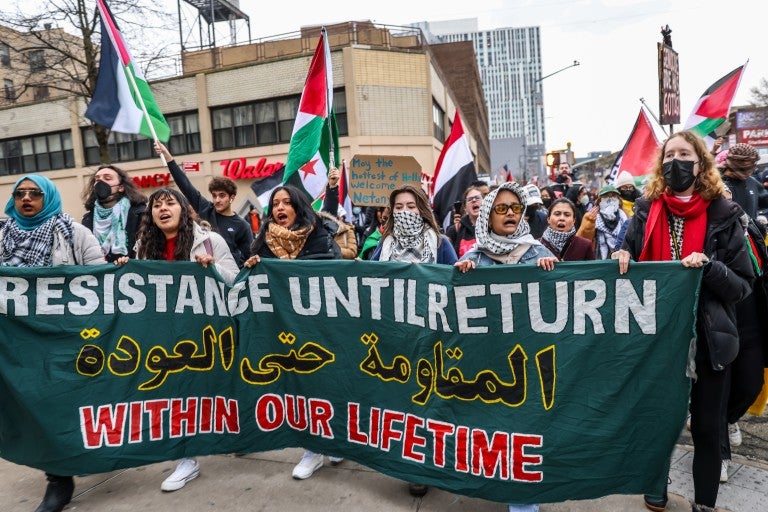August 25, 2023
An AJC delegation led by AJC CEO Ted Deutch this week met with Uruguayan President Luis Lacalle Pou in the capital of Uruguay, which has been a friend of Israel since before the rebirth of the modern Jewish State.
The meeting comes just weeks after Israel’s Foreign Minister Eli Cohen met with Lacalle Pou and invited him to Jerusalem to inaugurate Uruguay’s newest diplomatic mission to advance innovation, economic, and trade ties.
“Uruguay has long given a warm embrace to its Jewish community as well as to Israel,” Deutch said. “It was an honor to meet with President Lacalle Pou, who is not only a staunch ally of Israel but has fully committed his nation to the fight against antisemitism.”
That’s just one of many reasons why the ties between Uruguay and Israel matter to the Jewish people.
75-plus years of friendship with Israel
An Israeli street named for Uruguayan diplomat Enrique Fabregat symbolizes Uruguay’s steadfast support for Israel – even before the Jewish state declared its independence.
In 1947, Fabregat, then Uruguay’s representative to the United Nations, visited what was at the time British Mandate Palestine as part of the UN Special Commission on Palestine. He and other members of the commission ultimately recommended the partition of Palestine into a Jewish and an Arab state.
Four days after Israel declared its independence in 1948, Uruguay became the first South American nation to recognize Israel and later became home to the first Israeli embassy in South America.
From there, Uruguay and Israel continued to deepen their ties, with an emphasis on cultural and economic cooperation. Israel has provided expertise in agriculture and technology to Uruguay, which has helped Uruguay increase its productivity.
From 1954 to 1980, Uruguay also maintained its embassy in Jerusalem. However, the country relocated its embassy to Tel Aviv after Israel extended sovereignty over East Jerusalem. While opening a trade mission, as Uruguay recently did, falls one step short of returning the embassy to the Jewish state’s capital, it signals a strong and growing relationship.
In 2015, Uruguay also left the bloc of countries that automatically vote against the Jewish State at the United Nations, most recently voting against resolutions targeting Israel at the UN Human Rights Council.
“Uruguay was instrumental in the creation of the State of Israel and has not wavered in its commitment to the Jewish state’s well-being and the values both nations represent,” said Dina Siegel Vann, director of AJC’s Arthur and Rochelle Belfer Institute for Latino and Latin American Affairs (BILLA), which has cultivated that strong relationship with Uruguay for nearly two decades and invited Lacalle Pou address AJC Global Forum 2023 in Tel Aviv.
At the premiere Jewish global advocacy event, Lacalle Pou hailed the “shared history” between the two nations.
“I am more convinced than ever that what counts the most is the greatness of democracy and freedom. And the most important thing is the friendship among nations that uphold and cherish these values,” said Lacalle Pou, an AJC Project Interchange alumnus who traveled to Israel in 2018. “Along with 75 years of independence for Israel, today we celebrate 75 years of friendship between Uruguay and Israel.”
Defending democracy
Just as Israel stands out as the only democracy in the Middle East, Uruguay stands out as a democratic bellwether in Latin America. Contrary to the ambivalence displayed by many other nations in the Southern Hemisphere, Lacalle Pou has staked his alignment with the West regarding Ukraine.
He’s also made significant overtures toward Israel and the U.S. In November 2022, the U.S. and Uruguay convened the first Bilateral Inter-Ministerial Dialogue (ABID) focused on strengthening cooperation in key areas such as bilateral trade and investment, regional and global security, climate change, and democracy.
In June 2023, shortly after a bipartisan group of U.S. senators introduced the U.S. Uruguay Economic Partnership Act, Lacalle Pou held a surprise meeting in Washington with President Joe Biden. This meeting was reportedly meant to last 15 minutes but ended up being an hour and a half long.
“The strong trilateral relationship among Uruguay, the U.S., and Israel should stand out as an example for other nations in the Americas and beyond as to the mutual benefits in so many areas that are a result of this collaboration. From water management to cybersecurity, to innovation to the promotion of democratic practices, these are some of the dimensions of this exceptional relationship,” said AJC’s Siegel Vann.
Jewish community and fighting antisemitism
The Jewish community in Uruguay dates back to the 1870s when Jews came to the continent from Turkey. Some stopped in neighboring Argentina and Brazil before seeking opportunity in the uncharted land of Uruguay. But the largest wave of Jewish immigration came in the mid-20th Century, bringing a mix of Sephardic and Ashkenazi Jews. The community reached its peak of about 50,000 in the 1950s with up to 30 schools.
Schools emphasized the importance of Israel and gradually over time many Uruguayan Jews have made aliyah. Today, the Uruguayan Jewish community includes about 16,000 Jews who live in Uruguay and many more living in Israel.
Last year, AJC signed an association agreement with Comite Central Israelita de Uruguay, Uruguay's main Jewish communal organization. During his recent visit, Deutch signed an international partnership agreement with the Comite Central Israelita de Uruguay, marking AJC’s 38th global partnership.
Antisemitism in Uruguay has been limited to a few isolated incidents. In March 2016, a local convert to Islam murdered a Jewish community leader in Paysandu, an isolated incident that highlighted the danger of radicalization of local populations. Additionally, in October 2017, a Holocaust memorial in Montevideo was vandalized with antisemitic graffiti.
Shortly after Uruguay’s former Foreign Minister Luis Almagro became Secretary General of the Organization of American States (OAS), he announced at AJC Global Forum 2019 that the OAS would adopt the International Holocaust Remembrance Alliance’s (IHRA) Working Definition of Antisemitism. Less than a year later, Uruguay became the first Latin American country to adopt the Working Definition.
But it has not yet followed the lead of OAS, Argentina, Colombia, Honduras, Paraguay, the U.S., and other countries in designating Hezbollah in its entirety as a terrorist organization, despite the security threat it poses to the region since the two bombings in Argentina in 1992 and 1994. As part of the United Nations Interim Force in Lebanon (UNIFIL), Uruguay is hesitant to antagonize Hezbollah for fear of retaliation against their troops.
A way to water
A renewed effort to boost cooperation and innovation with Israel could come at a crucial time for Uruguay, the first country in the world to enshrine access to water as a fundamental right in a 2004 constitutional amendment.
A three-year drought exacerbated by climate change and deforestation of the Amazon has drained a previously abundant supply of fresh water, forcing officials to draw water from a source that mixes with salt water from the Atlantic Ocean. The salty water has raised levels of sodium and chloride to unsafe proportions.
Israel meanwhile is one of the world’s most advanced countries when it comes to water management as the Negev desert covers more than half of Israel’s land. The country now draws and desalinates 75 percent of its drinking water from the Mediterranean Sea, repurposes nearly 90 percent of its wastewater, and repurposes the “waste” in its wastewater to fuel its treatment facilities and fertilize its crops.
Israel’s national water company, Mekorot, has been active in Uruguay and several other countries over the past few years to help create master water management plans, consulting on desalination and wastewater treatment, groundwater hydrology, deep drilling, water supply, and water reduction.


